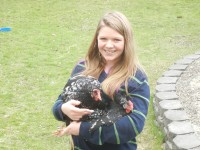
In the fall of 2009 my daughter Carly and I started talking about getting animals for the farm as a food source and as a source of manure for the garden. Because we live in the city, smaller livestock made much more sense and our city has laws against larger livestock so we settled on chickens for the farm. We soon realized that we knew nothing about raising chickens though so started to ask around at the Farmer’s Market for information. Someone pointed us in the direction of Yellow House Farm in Barrington, NH and we signed up for their day long “chicken school” the following spring.
In August of 2010 we got 4 Ancona chickens from Yellow House Farm and they have been with us ever since. Anconas are a heritage breed which means they are an older breed that is more unusual and, in some cases, endangered. They have been good layers and we have had a steady supply of eggs since they started laying when they are about 4-5 months old. We have enjoyed them so much that we decided to get 4 more this spring. This time we got two Araucanas, who lay blue and green eggs, and two Rhode Island Reds. In New Hampshire when you buy chicks that are less than a few weeks old you must buy 12 or more so we got together with two other families and bought 13 (an extra one in case there was a rooster in the bunch). The chicks have lived here on the farm since we bought them in March to allow the other families to get their coops and runs ready. The chicks (actually called pullets) are about 11 weeks old now and we are hoping they will begin laying in another month or two. Eight of the 13 will be joining their other families soon and we do believe we have a rooster among them so he will have to find a new home soon before he begins crowing and the neighbors complain. It looks like we will end up with just the 4 new chicks and the 4 “ladies” as we call them. They have been really easy to care for and we have been surprised at how much fun they are. Neighbors often come to visit the chickens. One of the advantages to having chickens in the city is fewer predators and because of that and because we are very careful to lock them into the coop every night we have not lost any chickens to predators as of yet. They also do a good job of helping to control bugs. If you are interested in getting chickens yourself and have questions, please feel free to contact me.
Here are a few links that I found helpful when I was thinking about getting chickens and an article about the chicken movement on urban farms in our country.





